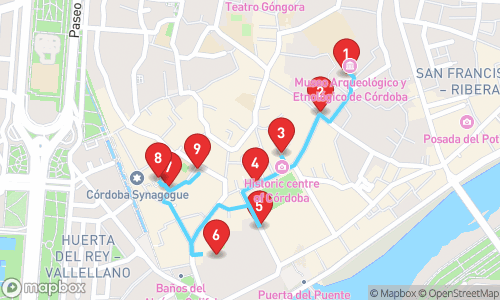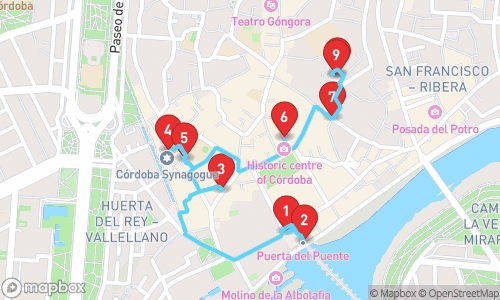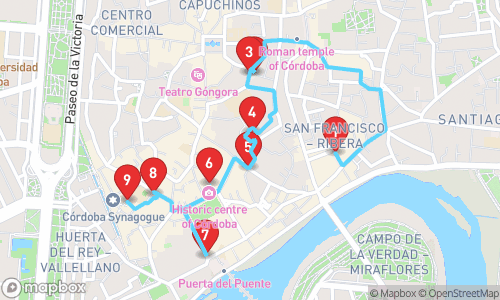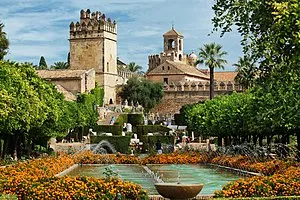



Exploring Historic Wonders: A Tour Through Córdoba

Tour Guide
Jenny Multilingual
Welcome to Córdoba! On this GPS guided audio tour, we will visit 16 stops on a route of 3.03km. This tour focusses mainly on history.
Locatello is an app where you can generate personal audio guided tours. Set your preferred distance, guide, language and theme, and a guided tour is created on the spot.
Walking Time
Distance
stops
Language
Tour Stops

Alcázar de los Reyes Cristianos
Courtyard of the Women: The eastern courtyard of the Alcázar, named after the feminine section of the former prison, features archaeological remains from various constructions, including the Roman castellum and the Andalusian Alcázar.

Molino de la Albolafia
A hydraulic flour mill, Molino de la Albolafia, is a medieval noria waterwheel along the Guadalquivir River in the historic center of Córdoba, Spain.

Puente romano
A stone bridge originally built by the Romans in the 1st century BC, reconstructed by the Arabs in the 8th century, and featuring 16 arches, one fewer than the original, and a total length of 247 meters.

Puerta del Puente
A Renaissance gate, built in the 16th century as part of urban renewal, was designed to improve the entrance to the city, handling high volumes of people and supplies, and features artistic and architectural merits.

Triunfo de San Rafael de la Puerta del Puente
A victory column, the Triunfo de San Rafael de la Puerta del Puente, a 27-meter tall sculptural complex with a black marble base, simulating a mountain with a red Jasper tower, adorned with statues of the arcángel and martyrs.

Palacio Episcopal
A historic archbishop's palace, opposite the west front of the Mosque-Cathedral of Córdoba, housing the seat of the Archbishop of Córdoba and serving as an important cultural landmark in the city.
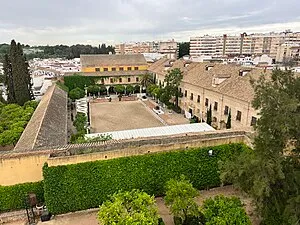
Royal Stables of Córdoba
A historic building, the Royal Stables of Córdoba, houses the best stallions and mares of the royal stud breed Andalusian horse, featuring military-style architecture with a cross-vaulted roof and sandstone columns.

Casa de Sefarad
A museum and cultural center opened in 2006, exploring the culture, history, and tradition of Sefarad (Sephardic Jews) in a 14th-century former Jewish home in the heart of Córdoba's Jewish Quarter. The museum features nine rooms and a specialized library, hosting guided tours, cultural events, and exhibitions.

Córdoba Synagogue
A desecrated synagogue, the Córdoba Synagogue is an historic former Jewish congregation and museum, featuring Mudéjar design and ornamentation with stucco panels, geometric patterns, and floral motifs, with Hebrew inscriptions wrapping around the windows.
Audio Preview
30 sec
Capilla de San Bartolomé
A chapel built between 1390 and 1410, richly decorated with Mudéjar art, features a rectangular floor, pointed arch entrances, and yeseria plasterwork. It is a historic monument listed since 1931.

Hospital de San Sebastián
A 16th-century former hospital in Córdoba, built to a design by Hernán Ruiz, el Viejo, and constructed between 1512-16. It previously served as a hospital, home for mothers and infants before being repurposed to house the Palace of Congresses and Exhibitions and the Office of Tourism.

Mosque-Cathedral of Cordoba
A congregational mosque and former Catholic cathedral. The Mosque-Cathedral of Cordoba's courtyard, known as the Patio de los Naranjos, features rows of orange trees, cypresses, and palm trees, surrounded by a gallery added in the 16th century.

Calleja de las Flores
A narrow street, Calleja de las Flores, ends in a plaza and is a popular tourist destination in Córdoba, positioned as an intersection of the Velázquez Bosco street.

Museo Arqueológico de Córdoba
A historic museum housing a collection of archeological items, featuring three main subgroups: Prehistory and Protohistory, Rome and Visigothic Culture, and Islam and Mudéjar art. The museum is housed in a Renaissance palace, incorporating an on-site Roman theatre.
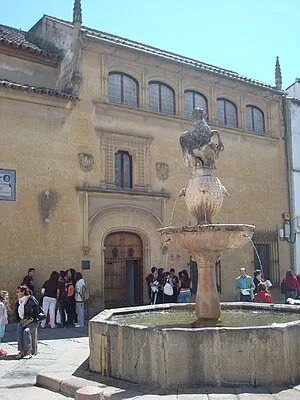
Hospital de la Caridad
A former hospital, the Hospital de la Caridad is now the Museo de Bellas Artes de Córdoba, showcasing fine arts and cultural treasures.
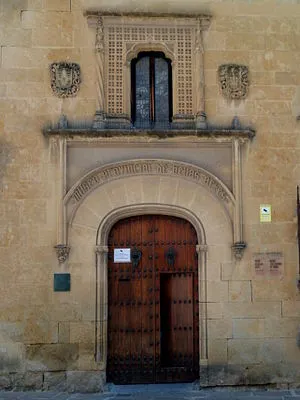
Museum of Fine Arts of Córdoba
A museum showcasing Cordobese art from the 14th century onwards, featuring works by local and Spanish masters, as well as international artists like Zuloaga, Tàpies, and Chillida. Its collection includes over 2,000 paintings, sculptures, and decorative arts.
Download App
Experience this tour and many more with our mobile app. Available for iOS and Android.
Audio Preview
Tour Map
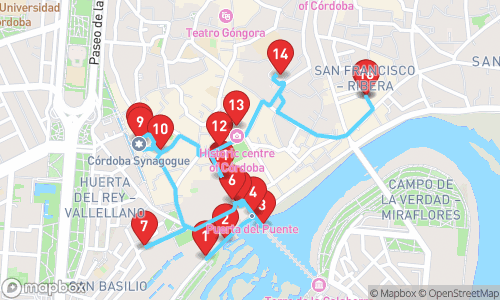
Quick Facts
- ✓GPS-guided navigation
- ✓Professional audio narration
- ✓Offline maps available
- ✓Premium content included
Why Choose This Tour
Expert Local Guide
Narrated by Jenny Multilingual, specializing in general tourism
Flexible Timing
Take the tour at your own pace, any time of day
